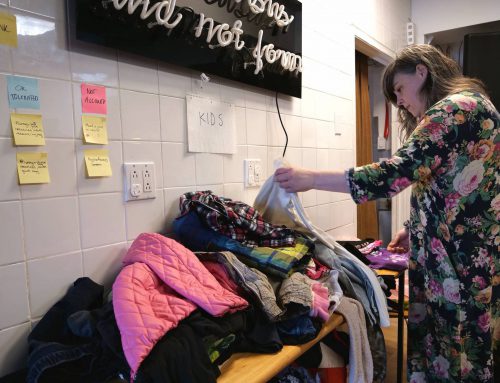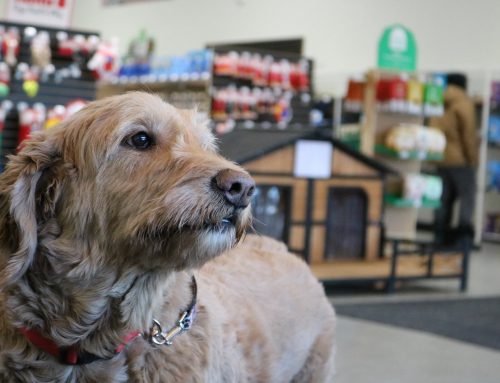BY Amanda Polese & Jonathan Ciaccia
Vaping groups are fighting a Quebec plan to ban the sale of flavoured e-liquids to discourage young people from vaping.
“You are saying it is a matter of public health, but you are creating a crisis,” says Valerie Gallant, director of the Association Québécoise des Vapoteries (AVQ).
When a 2015 vaping law was challenged in court, a judge ruled that e-cigarettes are a tool to reduce tobacco use and that vapers have the right to prioritize their health.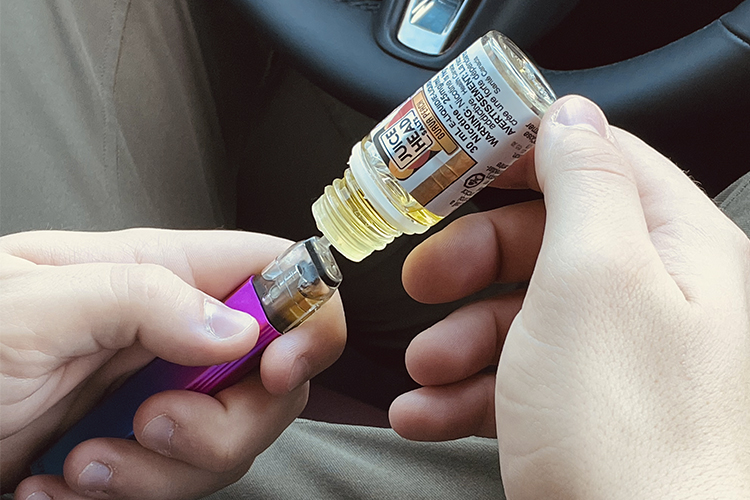
Pod vapes are easily accessible and can be refilled with any preferred e-juice flavour. Photo by Jonathan Ciaccia.
“Out of these bans, the same result comes back every time, tobacco use goes up. It’s a predictable outcome,” says Christina Xydous, who runs four Quebec vape shops.
However, some experts say vaping is also a risk. Alissa Sklar is a founder of Risk Within Reason and researches high-risk behaviours among youth. She links e-cigarette usage to several dangers, including lifelong nicotine addiction.
“All of a sudden the market jumped in because e-cigarettes were labeled as a safer alternative, and suddenly they were marketed to kids… and we had this massive epidemic of kids vaping,” she says.
Sklar agrees with the government regulations and considers them necessary to protect kids from an avoidable substance that she believes is harmful for the developing brain. She says there is data showing that “fun” e-liquid flavors are marketed to kids.
But Xydous believes the benefits of vaping as a smoking prevention tool far outweighs any concerns. She and the CDVQ started a letter-writing campaign to MNAs that aims to stop the regulation of e-liquids. They have sent over 20,000 letters.
Hear from those in the vaping industry on what they have to say regarding Quebec’s intentions on banning flavoured vapes. Video by Jonathan Ciaccia.
“If you ban all the flavors, people will go back to cigarettes,” says Dr. Gaston Ostiguy, a pulmonologist who ran the smoking cessation clinic at the Montreal Jewish General Hospital for 15 years. He believes that e-cigarettes are an excellent method to stop smoking.
According to The Royal College of Physicians, vaping is 95 per cent less harmful than cigarettes. The Cochrane Institute, a non-profit healthcare organization, agrees that e-cigarettes are a more effective way to quit smoking than other methods such as the patch or nicotine gum.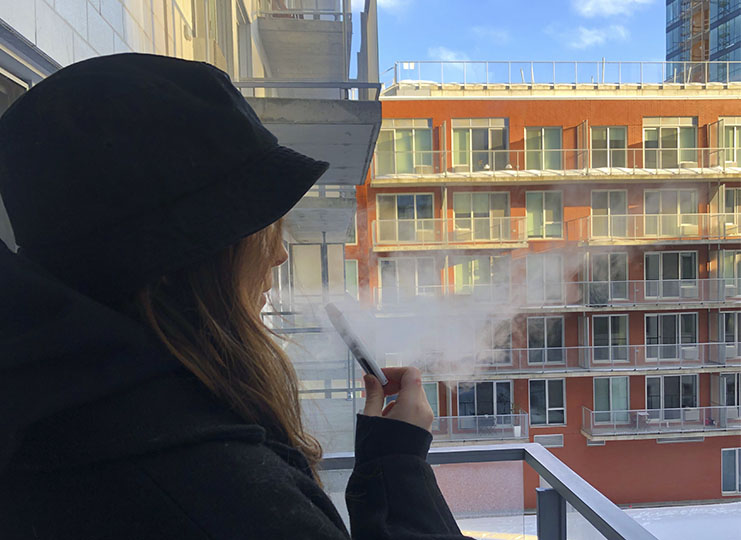
Emilia Gagne, 26, smokes a Vuse vape on her apartment balcony in the Old Port of Montreal. Photo by Amanda Polese.
“These are the products I like selling the least, especially to young people,” says Alexia Jerez, manager at Prohibition in Montreal. As a mother herself and having first-hand experience in the industry, she is wary of the flavoured tobacco market, and agrees with the regulations on flavors.
She says the flavours attract younger customers, and she gets many requests for more “exotic” e-liquids when she recommends tobacco or mango flavour.
“They want blueberry, pineapple—something fruity,” she says.
”Instead of starting at a high nicotine percentage to eventually lower it and quit, they start at a low percentage and slowly increase their tolerance,” she says. “Some of them have never smoked a cigarette in their life, but they’re addicted to vaping. It’s ludicrous if you ask me.”
Jerez urges employees to card anyone who looks under 25 years old.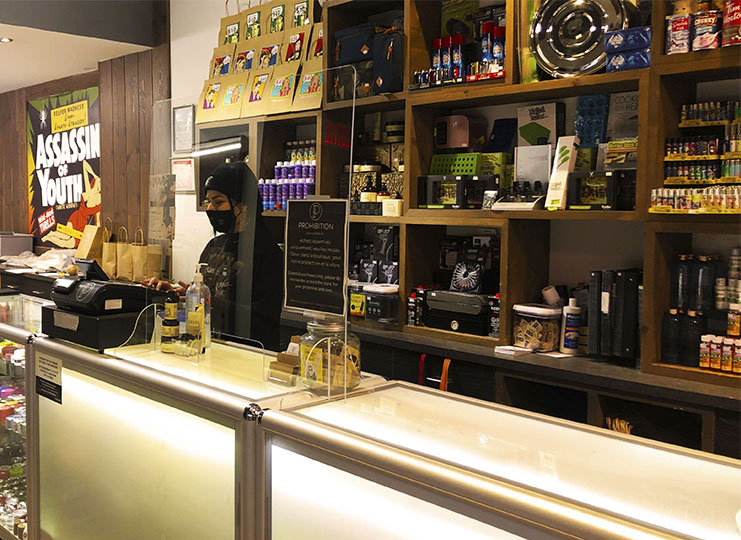
Alexia Jerez, manager at Prohibition Montreal, takes inventory. Photo by Amanda Polese.
Vape shop owners feel misrepresented, because the majority of them are doing all they can to stop kids from buying from their shops. Gallant even suggested the use of ID scanners in stores, and she is adamant on letting people know that fines can range from $500 to $2,500 if caught buying for minors.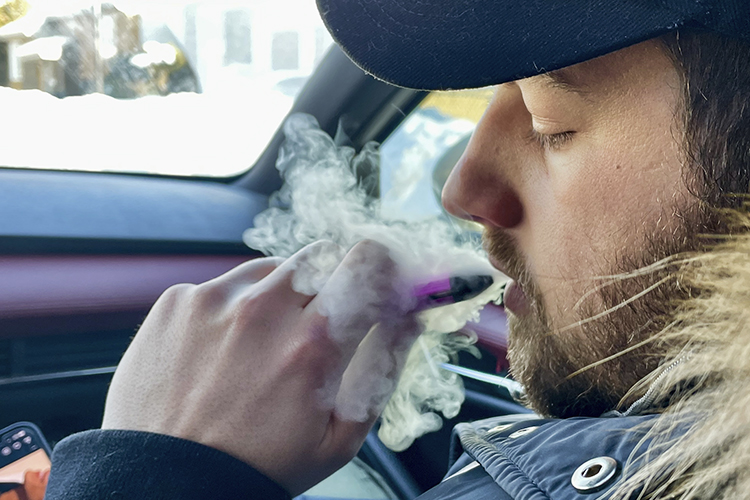
Andrew Anzovino, 23, smokes a pod vape in the comfort of his friend’s car on Sunday, January 23, 2021. Photo by Jonathan Ciaccia.
The regulations on flavoured e-liquid sales have already passed in Nova Scotia in 2020. The closure of many vape shops ensued within the first few months, according to Vincent Gagnon, Science Director of the AQV and owner of Le Vapoteur. On average, 85 percent of his e-liquid sales are flavours other than tobacco.
Gagnon was merchandising some of his products to convenience stores during the first wave lockdown, because he feared that his clients would go back to cigarettes, and it was the only way to supply it to them since his business was considered non-essential.
“If we were to run out of business because there were no more cigarette smokers, the business as a whole would have succeeded,” Gagnon says.
Test your knowledge on vaping after reading this article. Media by Amanda Polese.


